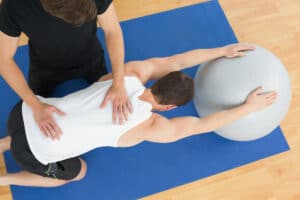 Aging can occur slowly or rapidly depending on your lifestyle, environment and awareness. It often creeps up on us unknowingly. A physical performance test can help detect early signs of decline. Many physical issues can be overcome if you catch them early.
Aging can occur slowly or rapidly depending on your lifestyle, environment and awareness. It often creeps up on us unknowingly. A physical performance test can help detect early signs of decline. Many physical issues can be overcome if you catch them early.
Frailty is something you want to avoid since it can seriously impair your ability to be independent. Moreover, to pursue your dreams and life purpose. A physical performance test that looks at balance, reaction time and something called proprioception, can detect early changes that can be addressed with simple techniques. Proprioception is defined as “the sense of the relative position of neighboring parts of the body. In Addition, strength of effort being employed in movement.” Dizziness, weakness, slow reaction time or loss of balance, all play a role in how well you are functioning.
Balance relies on muscle strength, and brain and nerve function including inner ear, vision, peripheral nerves and central nervous system signals. A physical performance test can determine which part or parts may be showing early signs of impairment. A slight decrease in any of these functions can lead to falls, fractures and frailty – a leading cause of disability. One in three people over the age of 65 years who are living in the community experience at least one fall each year and 10-15% of these falls are associated with serious injury.
Understanding the root cause of these falls by performing physical performance tests can be a lifesaver. Here are some types of physical performance tests that can detect early decline in function that if addressed early may improve your overall health and slow the aging process.
Balance
Good balance is important for daily life. It requires the complex integration of sensory information from the eyes, inner ears, feet and sensory nerves in all parts of the body and brain regarding the position of the body relative to the surroundings. To maintain your balance, you need the ability to generate appropriate muscle responses to control body movement.
- A simple physical performance test is to time how long you can stand on one leg and remain balanced without touching the walls or floor.
- Comparing how you perform against others in your age group can indicate how you are aging – faster or slower than your peers.
- The next step is to determine why your balance is poor by doing other physical performance tests such as testing muscle strength, core strength and neurocognitive tests such as attention and reaction time.
- You can develop better balance by exercising on a bosu ball, balance ball or one leg at a time, doing balance exercises in yoga or playing sports that require changes in position.
- By practicing you can achieve better balance.
Reaction time
If you don’t pay attention, you can miss the ball or whatever it is you want to focus on. Good reaction time is critical while driving, operating machinery, playing sports and many other tasks. Reaction time is dependent on attention and the nervous system speed as well as muscle response. Distractions, lack of attention, slow brain or nerve conduction or slow muscle reaction can lead to accidents and injury.
- A physical performance test would be to measure reaction time with and without distraction and compare to others in your age group. This could be a simple as grabbing a measuring stick while spelling or doing math problems.
- Using a validated computerized tool that measures your reaction time to seeing a certain number, color or pattern. This physical performance test also measures cognitive function and can help determine if the issue is attention or brain function.
- You can improve your reaction time with practice and attention. If the issue lies in your brain or nervous system, exercise, supplements and neurocognitive training can help.
Muscle strength and endurance
You need good muscle strength to respond to stimuli. If you are weak, have tremors or nervous system impairments, you may not be able to respond quickly. This can result in falls, fractures or accidents.
- A good physical performance test will measure strength in all muscle groups and compare your strength to others your age.
- Be sure to measure hand grip, biceps, triceps, chest, legs and abdomen using dynamometers, push ups, sit ups and weights.
- There are many standards that were developed and form is as important as the number of repetitions. Be sure to have testing done by someone with knowledge and training to avoid injury.
Reviews of clinical trials has determined that physical training exercise composed of strength, endurance and balance training reduced the incidence of falls. Furthermore, showed enhancements in gait, enhanced balance, and increased muscle strength. It seems to be the best strategy to improve rate of falls, gait ability, balance, and strength performance in physically frail older adults. Although, don’t wait until you are frail to start. The best time to start is as soon as you have a decline in function. Therefore, determined by a physical performance test.
There are other physical performance tests for vision, hearing, proprioception and sensory nerves that can determine if you are showing early signs of physical and mental decline. Having a comprehensive executive physical can detect impairment at the root cause. Therefore, give you a plan on what to focus on and how to improve it. Prevention is worth a pound of cure, so schedule a comprehensive Executive Physical before it’s too late.
Image Credit: (c) Can Stock Photo





She is a recognized and award-winning holistic, functional, integrative and anti-aging healthcare practitioner, speaker and author, and has been featured in ABC News, Forbes, WOR Radio and many media outlets to spread the word that you can live younger and healthier at any age.